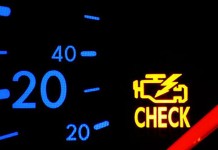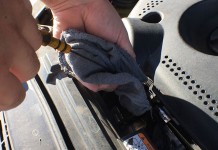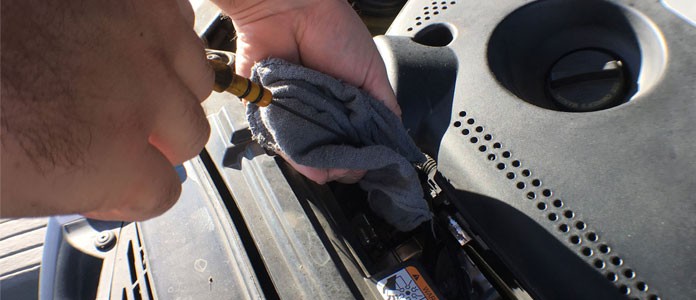I recently read a few articles that were very poorly written about “how your mechanic is ripping you off” and other such derogatory titles. The author suggested that your run of the mill Joe Schmo go and change his own brakes, oil, and/or spark plugs for no other reason than “it’s not that difficult”. The fact is that these jobs may have needed little skill to accomplish on your vehicles a couple of decades ago. However, cars built in this century require much more knowledge. You can end up costing yourself considerably more money in the long run by doing it wrong. With Engine Control Modules being as sensitive as ever, you will need a good mechanic that you can rely on to give you honest service and get the job done right for you the first time. Here are 5 ways to know that you have a good mechanic:
-
They let you know your manufacturers recommended mileage services.
-
They show you what is worn or has failed on your vehicle.
-
They have certifications hanging on the wall.
-
They let you know what you need now and what can wait.
-
Your problems get fixed.
Every car has different service intervals and different requirements at each interval to keep the vehicle running as designed. These services can include fluid exchanges, new filters, spark plugs, and timing belts to name a few. Most good automotive mechanics subscribe to online guides, communities, and technical helplines like Alldata, Mitchel, Identifix, iATN, etc. They will have service schedules from your manufacturer for your specific vehicle that are printable for your vehicle. If you have a good mechanic, he or she will print these mileage services out for you, so that you can keep up to date with your vehicles maintenance. If he is really on top of his game, he will be printing these out before they are due to help you plan for finances and time for your future visits. Vehicle maintenance is always cheaper than repair.
Now, most people walking into an automotive repair shop know little to nothing about automotive repair, and your service advisor knows this. The best ones want to build trust and good rapport between you and them. The easiest way to do that is to take you out to your vehicle and show you what parts need to be replaced and why. You may not know much about cars, but you can tell if something is leaking and you could see if something is loose or moving that isn’t supposed to. If it’s something that can’t be shown to you, they should show you a diagram on how the part works and the consequences that will ensue if it were to fail. Good technicians want you to understand what you need, how it works, and what happens if you don’t fix it. You should feel more comfortable knowing that you are replacing things that actually need to be replaced.
In most states, certifications are not required in order to perform work on automotive vehicles. Unfortunately, this makes it very simple for someone to just walk into the automotive repair field without any prior knowledge of the inner workings of an automotive vehicle. The guy changing your oil today could’ve been the one serving you your burger last week. Good mechanics are proud of their craft and the amount of money and time they have invested to hone their skills as a technician. These honors are commonly displayed in waiting areas or worn on the sleeves of the best technicians. Now I’m not saying that not having any certifications means that they are a bad technicians. Having certifications doesn’t automatically make them a good technician either. However, if you see ASE Certifications, you can probably count on quality work. I am just merely stating that if there are awards and certificates displayed, they are proud of what they do and this is the type of person that you want working on your vehicle.
Depending on the mileage and age of your vehicle, and how well you maintain it, your list of necessary repairs can be really short or really long each time you come in for an oil change. Depending on if you take care of the work or not, that list might just keep growing. As long as you are following your mechanics advise, the list should stay small and manageable at each service. A good mechanic will help you plan your repairs to fit your time and budget. Most repairs can be classified into three separate categories: broken or at the end of its useful life, worn or near the end of its useful life, and manufacturer scheduled or general maintenance. The top of the list items are harder to plan for than the bottom of the list items like maintenance. If it’s broken, you have to fix it now. If it’s worn, you can wait a little bit longer to fix it, but it should be fixed soon. Maintenance is usually at the bottom of the list of urgency, but shouldn’t be neglected because that’s what leads to top of the list items. I’ll say it again; maintenance is always cheaper than repair.
Lastly, but probably most important, is that your problems are actually fixed before you leave the repair shop. Without this, everything else listed above is moot point. There may be times where your mechanic doesn’t diagnose your car correctly, or something just doesn’t get repaired quite like you thought it should. It happens, mechanics are humans too. In fact, if you asked some mechanics, they say their job diagnosing cars may be more difficult than diagnosing human illness as a physician. Unlike humans, cars can’t tell a mechanic what is wrong with them and there are hundreds of different models that are forever changing an getting more complicated. They need their skills and experience as technicians to hunt down the problem which can be time-consuming and tricky. Especially if the problem is intermittent, but these instances should be far and few between. If you have to constantly go back more than once for the same problem each time you get something fixed, it might be time to look for a new mechanic.
Cars on the road today are increasingly complex with more computers controlling more electronics, you almost need to be an IT professional to work as an automotive technician. Finding a good mechanic and sticking with them is more important now than ever before. Before you believe other articles that say you can still do your own car repair, ask a reputable mechanic if that seemingly easy job is within your skill set. If you’ve read this article and you feel that your technician just isn’t cutting the mustard and not up to par, don’t go blindly looking for a new mechanic to service your vehicle. Check the internet, look at reviews & comments, and ask for referrals from your friends. You should be looking for someone that has made his customers so happy that they’ve taken the time to write a good review online or are willingly referring their guy to you for service. Let me know your thoughts below or if you have a mechanic that you trust implicitly and does great work for you, plug in their name and website too in the comments below!














#1 can easily be resolved by reading the owners manual.
But is very true with customers moving from 2009 and older vehicles to newer ones.
even a basic Corolla & Civic have way longer durations between oil changes 10,000 for the Corolla & 8000+ for the Civic (the Civic does not use a set distance, but calculates engine workload)
Longer durations I will recommend FULL Synthetics over non synthetics. VVTi & Vtech (engine internals that help maximize power and fuel economy on demand) do not like sludge buildup.
Owner responsibility still applies. DO NOT GAS AND GO! You should still check vital fluid levels periodically. Ignoring warning lights in the long run can create a more expensive repair. Ignoring the TPMS light is fine and dandy until the tire fails from lack of air (oh, that light has been on for over 2 months and i didn’t know what it meant but I kept on driving anyway, this is the most common response in that line of questioning) That is you choosing to be ignorant and you have only yourself to blame.
I understand Jareds point, Honda has a slogan that they use for their powersports product lineup regarding safety; Stupid Hurts both financially and physically